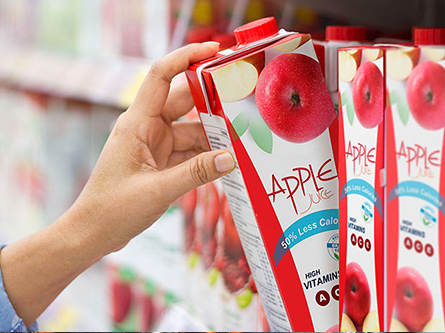It’s no secret that kids (and some of us adults) love fruit juice. Many of us grew up drinking fruit juice, and parents often think 100% fruit juice is healthy. But is it really?
UC Davis Health pediatricians Lena van der List and Dean Blumberg tackled this juicy topic in their podcast Kids Considered:
We often like the taste of fruit juice because it’s a sweet drink. But it’s no secret that sweet often means more sugar, even if it’s natural sugar.
Think about whole fruits that are sweeter – they have more natural sugars that make them taste sweet. Same goes for those 100% fruit juices, which may not have any added sugars. Too much sugar of any kind isn’t healthy.
Fruit juices often have added flavors, food coloring or other additives.
Does 100% fruit juice still have sugar?
Now back to the sugar concerns: Fruit juices are a concentrated source of sugar for children.
In one popular apple juice brand, which we have chosen not to name, one 4 oz. box contained 14 grams of sugar. That equals about 3 teaspoons of sugar.
In a 6 oz. box of a popular orange juice, it was found to have 18 grams of sugar, or a little more than 4 teaspoons.
If you compare that to a can of soda, in terms of volume, it’s about the same – and those are fruit juices with no added sugar.
Is eating whole fruit that much better than drinking fruit juice?
Yes! Whole fruits provide fiber by way of the skin and pulp. Fiber has been shown to decrease the risk of colon cancer, lower cholesterol and help control blood pressure. It’s also associated with living longer, studies suggest.
In addition, whole fruits contain some vitamins that don’t make it into the juice. Some edible fibers in the skin and pulp are removed during the juicing process.
Whole fruit also takes longer to eat causing a slower calorie intake, which can decrease the risk of obesity. Finally, fruit juice has more concentrated sugar and calories as compared to whole fruit.
What other negative impacts can fruit juice have?
Drinking fruit juice can replace consuming other beneficial liquids, like breast milk for babies or water for the rest of us.
The more concentrated sugar and calories in fruit juice can lead to obesity and inappropriate weight gain. Excessive weight gain is associated with high blood pressure, hypertension, stroke, diabetes and other negative health issues later in life.
Is it safer to dilute fruit juice with water?
Not necessarily. Even diluted juice can increase the risk of cavities and decrease the chance of drinking other beneficial liquids.
My child loves fruit juice, so is there a safe amount to give them?
The American Academy of Pediatrics recommends children under 1 year of age drink no fruit juice. It is ok for children 1 to 3 years of age to drink up to 4 oz. per day, but parents should focus on offering whole fruit or water instead.
Children ages 4 to 6 can have 4 to 6 oz. of fruit juice per day. Children older than 6 should not drink more than 8 oz. per day, which is basically a small glass.
Children who are overweight or obese should eliminate juice from their diet.
A few juicy words of advice for parents from the pediatricians:
- Don’t put your child to bed with juice or milk. It leaves teeth covered with sugar and can feed the bacteria that causes cavities and tooth decay.
- Avoid giving your children fruit juice in sippy cups. Sippy cups make it easier to drink juice throughout the day, leading kids to decrease healthier food intake.
- Negative impacts of fruit juice will have negative impacts on obese children. Ultimately, children should avoid drinking any sugary drinks, including sports drinks and other sweet drinks. Just by cutting out those liquids, you will likely see dramatic effects on a child’s weight.




